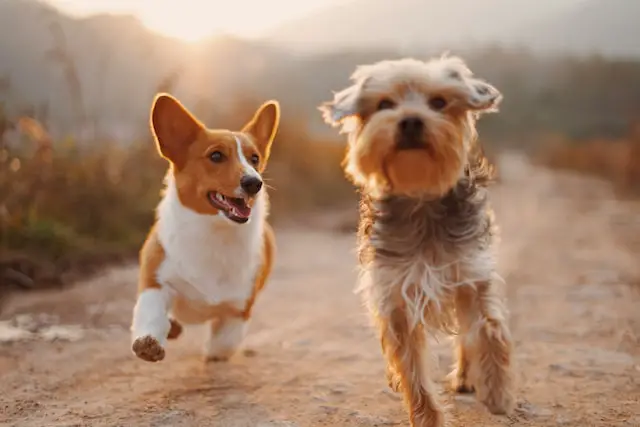Dogs do not purr in the same way that cats do, as they do not have a specific organ or mechanism for producing purring sounds. However, dogs may make noises that are similar to purring for a variety of reasons.

One reason why dogs may make a purring-like sound is to express contentment or relaxation. Dogs may make a low, rumbling sound when they are feeling relaxed or comfortable, which can be similar to a cat’s purr. This sound is often accompanied by other signs of relaxation, such as lying down, closing their eyes, and wagging their tail slowly. Some dogs may also make a purring-like sound when they are being petted or cuddled, as a way of expressing their pleasure and enjoying the physical contact with their human companions.
Another reason why dogs may make a purring-like sound is to communicate with other dogs. Dogs use a variety of vocalizations and body language to communicate with each other, and some of these sounds may be similar to a purr. For example, dogs may make a low, rumbling sound when they are playing or interacting with other dogs, as a way of signaling that they are friendly and playful. This sound can also be used to assert dominance or to warn other dogs to back off, depending on the context and the dog’s body language.
Dogs may also make a purring-like sound as a sign of stress or anxiety. Some dogs may make a low, rumbling sound when they are feeling anxious or fearful, as a way of self-soothing and calming themselves down. This sound can be similar to a cat’s purr in terms of its tone and frequency, but the underlying emotional state is quite different.
Finally, some dogs may make a purring-like sound as a sign of illness or discomfort. For example, dogs with respiratory issues or heart problems may make a wheezing or raspy sound that can be mistaken for purring. It is important to monitor your dog’s health and behavior closely if they are making unusual sounds or exhibiting other signs of illness or discomfort.
In conclusion, while dogs do not purr in the same way that cats do, they may make noises that are similar in tone or frequency for a variety of reasons. Whether your dog is expressing contentment and relaxation, communicating with other dogs, self-soothing in response to stress or anxiety, or indicating that they are unwell, it is important to pay attention to their body language and behavior in order to better understand their vocalizations and ensure their well-being.